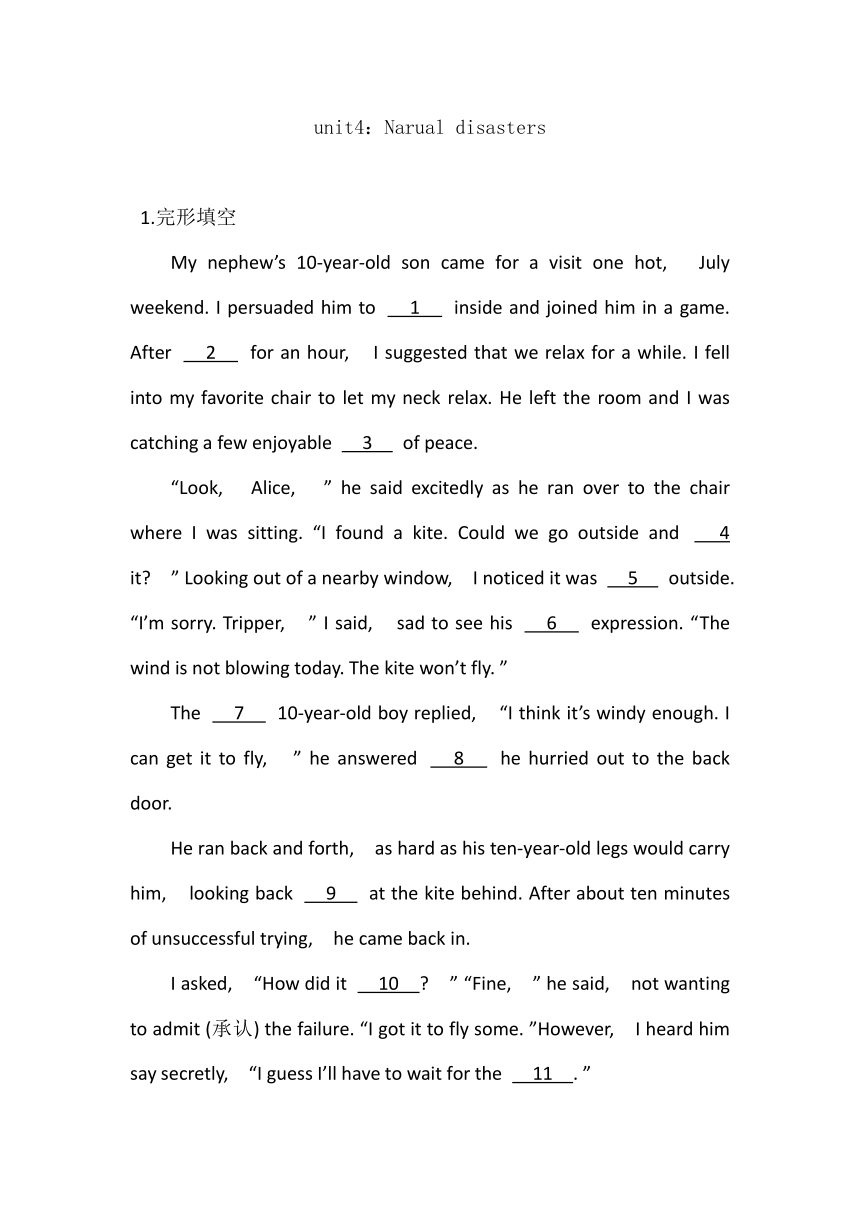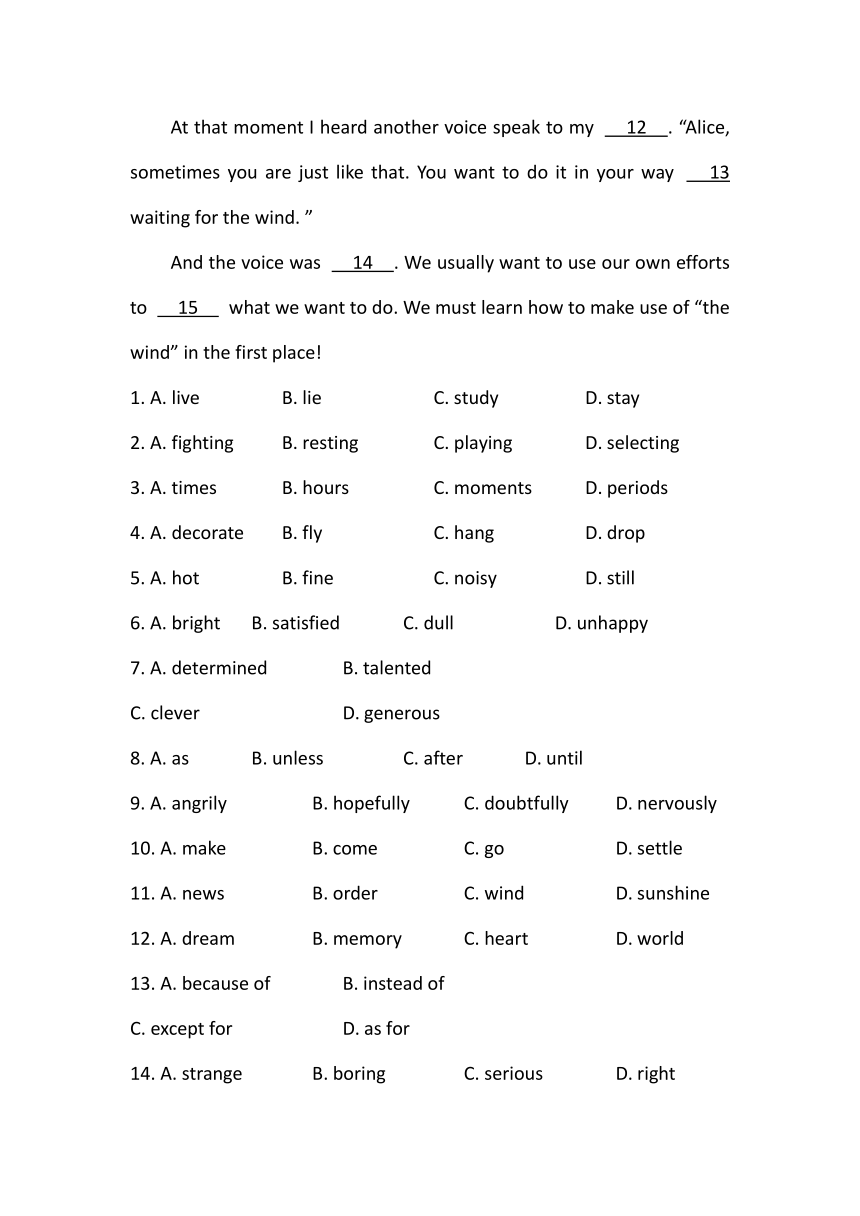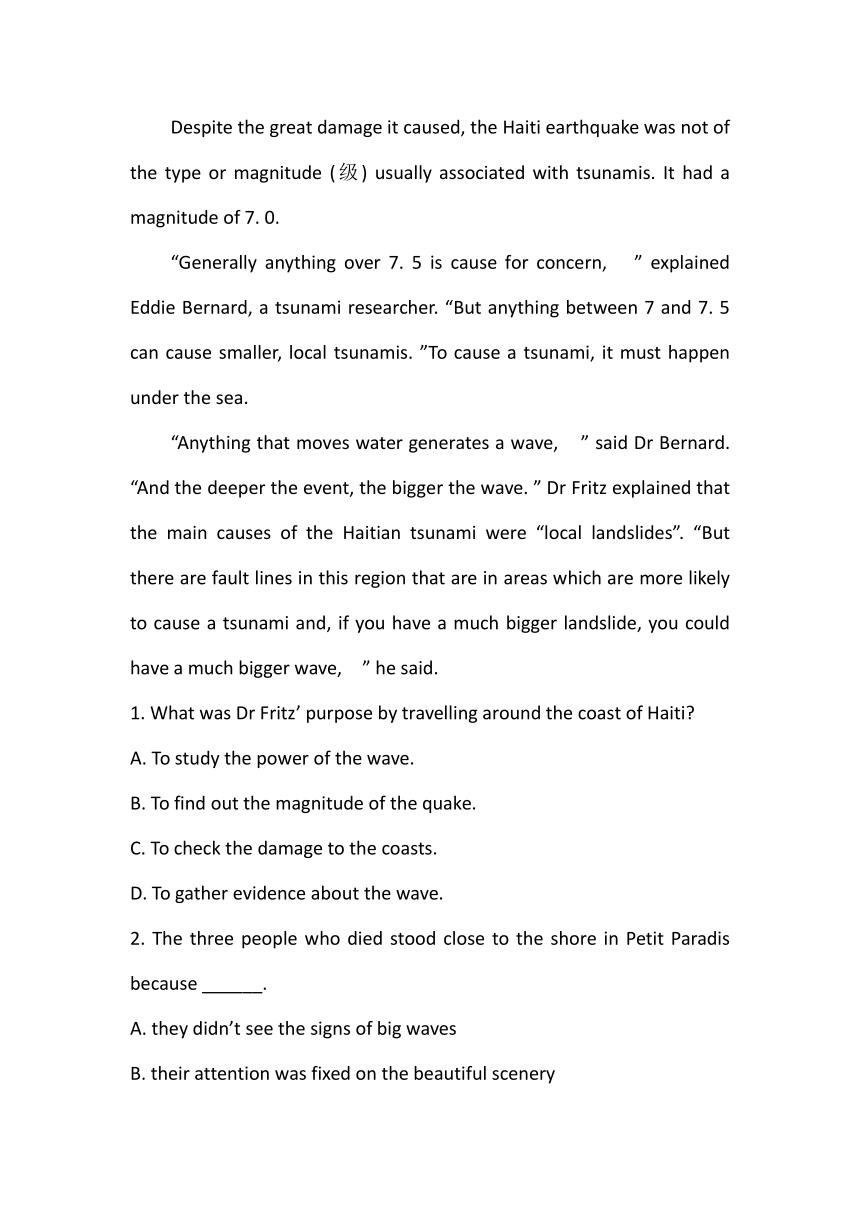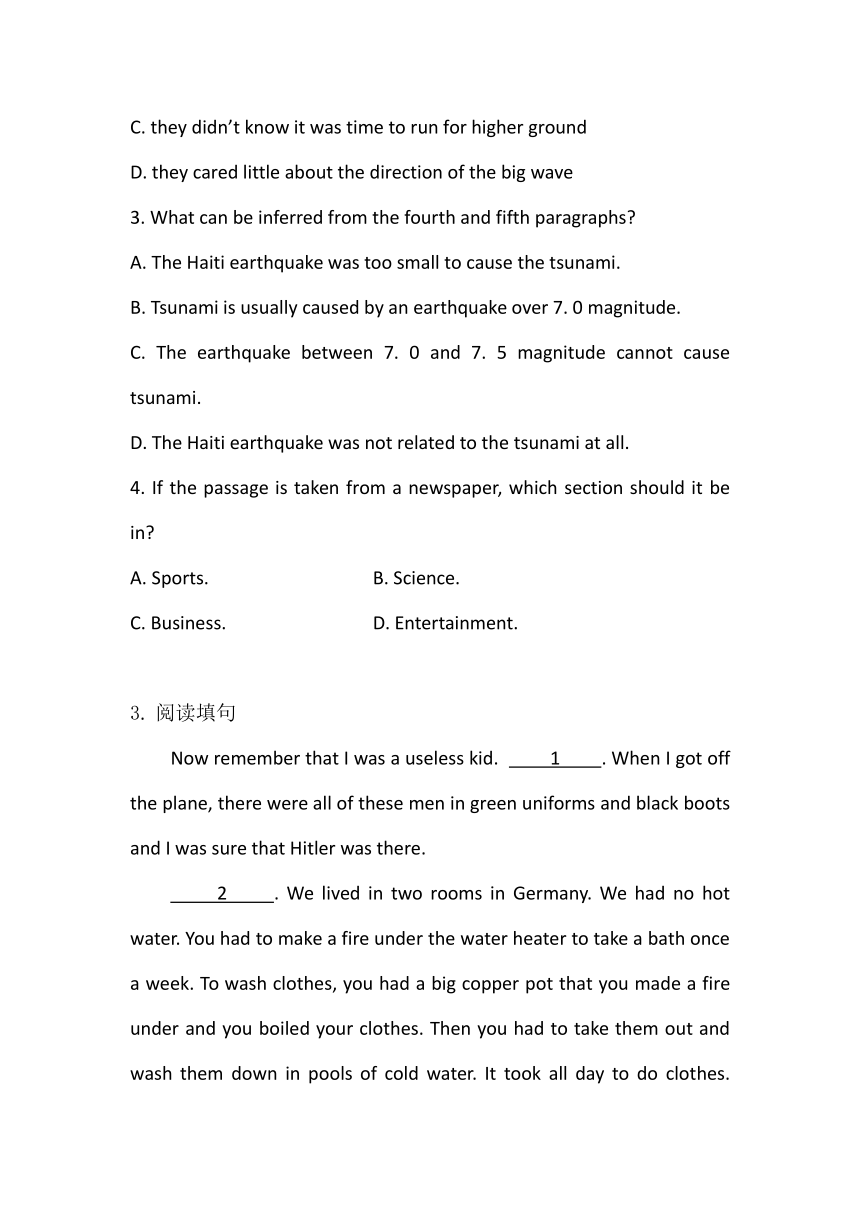2021-2022学年人教版(2019)必修一:Unit4 Narual disasters 课后练习(含答案)
文档属性
| 名称 | 2021-2022学年人教版(2019)必修一:Unit4 Narual disasters 课后练习(含答案) |

|
|
| 格式 | docx | ||
| 文件大小 | 31.3KB | ||
| 资源类型 | 教案 | ||
| 版本资源 | 人教版(2019) | ||
| 科目 | 英语 | ||
| 更新时间 | 2021-09-04 00:00:00 | ||
图片预览





文档简介
unit4:Narual
disasters
1.完形填空
My
nephew’s
10-year-old
son
came
for
a
visit
one
hot,
July
weekend.
I
persuaded
him
to
1
inside
and
joined
him
in
a
game.
After
2
for
an
hour,
I
suggested
that
we
relax
for
a
while.
I
fell
into
my
favorite
chair
to
let
my
neck
relax.
He
left
the
room
and
I
was
catching
a
few
enjoyable
3
of
peace.
?
“Look,
Alice,
”
he
said
excitedly
as
he
ran
over
to
the
chair
where
I
was
sitting.
“I
found
a
kite.
Could
we
go
outside
and
4
it?
”
Looking
out
of
a
nearby
window,
I
noticed
it
was
5
outside.
“I’m
sorry.
Tripper,
”
I
said,
sad
to
see
his
6
expression.
“The
wind
is
not
blowing
today.
The
kite
won’t
fly.
”?
The
7
10-year-old
boy
replied,
“I
think
it’s
windy
enough.
I
can
get
it
to
fly,
”
he
answered
8
he
hurried
out
to
the
back
door.
?
He
ran
back
and
forth,
as
hard
as
his
ten-year-old
legs
would
carry
him,
looking
back
9
at
the
kite
behind.
After
about
ten
minutes
of
unsuccessful
trying,
he
came
back
in.
?
I
asked,
“How
did
it
10 ?
”
“Fine,
”
he
said,
not
wanting
to
admit
(承认)
the
failure.
“I
got
it
to
fly
some.
”However,
I
heard
him
say
secretly,
“I
guess
I’ll
have
to
wait
for
the
11 .
”?
At
that
moment
I
heard
another
voice
speak
to
my
12 .
“Alice,
sometimes
you
are
just
like
that.
You
want
to
do
it
in
your
way
13
waiting
for
the
wind.
”?
And
the
voice
was
14 .
We
usually
want
to
use
our
own
efforts
to
15
what
we
want
to
do.
We
must
learn
how
to
make
use
of
“the
wind”
in
the
first
place!
1.
A.
live
B.
lie
C.
study
D.
stay
2.
A.
fighting
B.
resting
C.
playing
D.
selecting
3.
A.
times
B.
hours
C.
moments
D.
periods
4.
A.
decorate
B.
fly
C.
hang
D.
drop
5.
A.
hot
B.
fine
C.
noisy
D.
still
6.
A.
bright
B.
satisfied
C.
dull
D.
unhappy
7.
A.
determined
B.
talented
C.
clever
D.
generous
8.
A.
as
B.
unless
C.
after
D.
until
9.
A.
angrily
B.
hopefully
C.
doubtfully
D.
nervously
10.
A.
make
B.
come
C.
go
D.
settle
11.
A.
news
B.
order
C.
wind
D.
sunshine
12.
A.
dream
B.
memory
C.
heart
D.
world
13.
A.
because
of
B.
instead
of
C.
except
for
D.
as
for
14.
A.
strange
B.
boring
C.
serious
D.
right
15.
A.
imagine
B.
complete
C.
fancy
D.
decide
2.阅读理解
Researchers
have
discovered
that
January’s
huge
quake
in
Haiti
caused
a
tsunami.
Along
with
four
Haitian
colleagues,
Dr
Hermann
Fritz,
a
professor,
travelled
around
the
coast
of
Haiti.
He
wanted
to
find
out
what
had
happened
before
the
evidence
disappeared
forever.
He
had
heard
reports
and
saw
evidence
that
a
wave
up
to
3-meter
high
had
hit
some
areas
of
the
coast
south
of
the
capital
following
the
quake
near
Port
au
Prince.
It
had
killed
at
least
three
people
and
engulfed
(吞没)
buildings.
Dr
Fritz
presented
some
of
his
findings
at
the
Ocean
Sciences
meeting
in
Portland,
the
US.
“This
was
a
relatively
small
event,
”
he
told
BBC
News.
“Most
of
the
deaths
were
due
to
the
earthquake,
but
at
least
three
victims
we
know
survived
the
earthquake
and
were
hit
by
the
wave.
”
These
three
victims
were
a
father
and
his
two
young
sons.
They
were
standing
close
to
the
shore
in
Petit
Paradis,
watching
the
wave
instead
of
heading
for
higher
ground.
Draw-back
in
the
water
level
is
a
sign
that
a
big
wave
is
coming.
“It
clearly
showed
a
lack
of
tsunami
education,
”
Dr
Fritz
said.
“It
was
pure
luck
that
the
wrong
information
did
not
kill
more
people
in
this
case.
”
Despite
the
great
damage
it
caused,
the
Haiti
earthquake
was
not
of
the
type
or
magnitude
(级)
usually
associated
with
tsunamis.
It
had
a
magnitude
of
7.
0.
“Generally
anything
over
7.
5
is
cause
for
concern,
”
explained
Eddie
Bernard,
a
tsunami
researcher.
“But
anything
between
7
and
7.
5
can
cause
smaller,
local
tsunamis.
”To
cause
a
tsunami,
it
must
happen
under
the
sea.
“Anything
that
moves
water
generates
a
wave,
”
said
Dr
Bernard.
“And
the
deeper
the
event,
the
bigger
the
wave.
”
Dr
Fritz
explained
that
the
main
causes
of
the
Haitian
tsunami
were
“local
landslides”.
“But
there
are
fault
lines
in
this
region
that
are
in
areas
which
are
more
likely
to
cause
a
tsunami
and,
if
you
have
a
much
bigger
landslide,
you
could
have
a
much
bigger
wave,
”
he
said.
1.
What
was
Dr
Fritz’
purpose
by
travelling
around
the
coast
of
Haiti?
A.
To
study
the
power
of
the
wave.
B.
To
find
out
the
magnitude
of
the
quake.
C.
To
check
the
damage
to
the
coasts.
D.
To
gather
evidence
about
the
wave.
2.
The
three
people
who
died
stood
close
to
the
shore
in
Petit
Paradis
because
______.
?
A.
they
didn’t
see
the
signs
of
big
waves
B.
their
attention
was
fixed
on
the
beautiful
scenery
C.
they
didn’t
know
it
was
time
to
run
for
higher
ground
D.
they
cared
little
about
the
direction
of
the
big
wave
3.
What
can
be
inferred
from
the
fourth
and
fifth
paragraphs?
A.
The
Haiti
earthquake
was
too
small
to
cause
the
tsunami.
B.
Tsunami
is
usually
caused
by
an
earthquake
over
7.
0
magnitude.
C.
The
earthquake
between
7.
0
and
7.
5
magnitude
cannot
cause
tsunami.
D.
The
Haiti
earthquake
was
not
related
to
the
tsunami
at
all.
4.
If
the
passage
is
taken
from
a
newspaper,
which
section
should
it
be
in?
A.
Sports.
B.
Science.
C.
Business.
D.
Entertainment.
3.
阅读填句
Now
remember
that
I
was
a
useless
kid.
1 .
When
I
got
off
the
plane,
there
were
all
of
these
men
in
green
uniforms
and
black
boots
and
I
was
sure
that
Hitler
was
there.
?
2 .
We
lived
in
two
rooms
in
Germany.
We
had
no
hot
water.
You
had
to
make
a
fire
under
the
water
heater
to
take
a
bath
once
a
week.
To
wash
clothes,
you
had
a
big
copper
pot
that
you
made
a
fire
under
and
you
boiled
your
clothes.
Then
you
had
to
take
them
out
and
wash
them
down
in
pools
of
cold
water.
It
took
all
day
to
do
clothes.
3 .
?
We
bought
our
vegetables
from
a
vegetable
man
coming
around,
and
we
bought
milk
from
a
man
who
would
come
around.
4 .
I
could
understand
them
really
well.
I
could
walk
through
the
neighborhood
and
they
would
talk
about
this
American
person,
and
I
understood
every
word
that
they
said
but
they
didn’t
know
it.
?
I
liked
the
air
force
life.
We
liked
moving,
meeting
all
of
the
people,
having
the
new
experiences.
5 .
It
was
never
boring
because
we
were
always
on
a
new
adventure.
?
A.
Life
is
rich
B.
It
was
an
interesting
life
C.
I
learned
some
German
words
D.
We
still
have
friends
there
E.
It’s
easy
for
us
to
travel
by
plane
now
and
then
F.
It
was
a
seventeen-hour
flight
from
New
York
to
Germany
G.
John
picked
me
up
in
a
German
Ford
that
only
went
35
miles
an
hour
参考答案
完形填空
1.D。根据上文的one
hot,
July
weekend和后面的
joined
him
in
a
game可知因为天气太热,
作者说服了他待(stay)在屋里。
2.C。由上文的joined
him
in
a
game可知作者和他在玩(play)游戏。
3.C。小家伙出去了,
作者可以享受片刻的宁静。a
few
moments
一会儿,
片刻。
4.B。由本段最后一句The
kite
won’t
fly.
可得出答案。
5.D。根据本段最后作者所说的话“The
wind
is
not
blowing
today.
The
kite
won’t
fly.
”可知外面没有风。
6.D。迫切的要求被拒绝,
自然会露出不高兴的(unhappy)神色。
7.A。根据小孩的话“I
think
it’s
windy
enough.
I
can
get
it
to
fly”可知小孩想出去放风筝的决心是坚定的(determined)。
8.A。他边说边向后门跑去。as引导时间状语从句,
表示:
一边……一边……。
9.B。小孩边跑边回头看他的风筝,
自然是希望(hopefully)它能如愿飞起来。
10.C。风筝飞起来了吗?
状况如何?
go
进展,
How
did
it
go
?
风筝飞得状况如何?
11.C。没风风筝是飞不起来的,
所以他说要等风。
12.C。此时此刻作者的内心(heart)似乎有个声音在说……。
13.B。你有时候也像小孩似的,
按自己的想法去做,
而不是(instead
of)等到风刮起来的时候。
14.D。由下句We
usually
want
to
use
our
own
efforts
to
______what
we
want
to
do.
可知刚才内心听到的话是对的(right)。?
15.B。根据句中的use
our
own
efforts可知应是用我们的努力去完成(complete)我们想做的事。
2.阅读理解
1.D。细节理解题。根据第一段第三句可知Dr
Fritz和他的同事们到海地海岸考察的目的是寻找地震引发海啸的证据。
2.C。细节理解题。根据第三段可知三名死难者缺乏海啸的常识,
他们不知道那时是该跑到高处去的时间。
3.B。推理判断题。根据第四段一般认为7级以上的地震可能会引发海啸。这次海地地震的震级是7级,
它通常被认为不是引发了海啸的地震等级。但不能说这次地震太小。A项说法不正确。C、D两项表述也不对。
4.B。文章出处题。本文是议论文。几位研究者通过对海地海啸原因的研究发现海地海啸主要是由海底滑坡而不是单纯由地震造成的。故本文属于科普类文章。
3.阅读填句
1.
F。由下文走下飞机时的见闻可知,
此处指乘坐飞机的情况,
选项F中信息“从纽约到德国有14小时的航程”,
选项F合适。
2.
G。顺承上段作者下飞机的见闻,
结合下句居住在德国的两间屋子里可知,
离开机场,
到德国的一个地方,
能承上启下的选项G合适。
3.
B。从本段描述的在德国居住、生活情况可知,
生活温馨、有趣,
此处总结本段内容,
故答案为B。
4.
C。根据下句作者对德国人说的话的理解可知,
作者学到了一些德语,
选项C合适。
5.
A。根据下文It
was
never
boring
because
we
were
always
on
a
new
adventure.
可知生活并不是枯燥无味的,
生活是丰富多彩的,
故选A。
disasters
1.完形填空
My
nephew’s
10-year-old
son
came
for
a
visit
one
hot,
July
weekend.
I
persuaded
him
to
1
inside
and
joined
him
in
a
game.
After
2
for
an
hour,
I
suggested
that
we
relax
for
a
while.
I
fell
into
my
favorite
chair
to
let
my
neck
relax.
He
left
the
room
and
I
was
catching
a
few
enjoyable
3
of
peace.
?
“Look,
Alice,
”
he
said
excitedly
as
he
ran
over
to
the
chair
where
I
was
sitting.
“I
found
a
kite.
Could
we
go
outside
and
4
it?
”
Looking
out
of
a
nearby
window,
I
noticed
it
was
5
outside.
“I’m
sorry.
Tripper,
”
I
said,
sad
to
see
his
6
expression.
“The
wind
is
not
blowing
today.
The
kite
won’t
fly.
”?
The
7
10-year-old
boy
replied,
“I
think
it’s
windy
enough.
I
can
get
it
to
fly,
”
he
answered
8
he
hurried
out
to
the
back
door.
?
He
ran
back
and
forth,
as
hard
as
his
ten-year-old
legs
would
carry
him,
looking
back
9
at
the
kite
behind.
After
about
ten
minutes
of
unsuccessful
trying,
he
came
back
in.
?
I
asked,
“How
did
it
10 ?
”
“Fine,
”
he
said,
not
wanting
to
admit
(承认)
the
failure.
“I
got
it
to
fly
some.
”However,
I
heard
him
say
secretly,
“I
guess
I’ll
have
to
wait
for
the
11 .
”?
At
that
moment
I
heard
another
voice
speak
to
my
12 .
“Alice,
sometimes
you
are
just
like
that.
You
want
to
do
it
in
your
way
13
waiting
for
the
wind.
”?
And
the
voice
was
14 .
We
usually
want
to
use
our
own
efforts
to
15
what
we
want
to
do.
We
must
learn
how
to
make
use
of
“the
wind”
in
the
first
place!
1.
A.
live
B.
lie
C.
study
D.
stay
2.
A.
fighting
B.
resting
C.
playing
D.
selecting
3.
A.
times
B.
hours
C.
moments
D.
periods
4.
A.
decorate
B.
fly
C.
hang
D.
drop
5.
A.
hot
B.
fine
C.
noisy
D.
still
6.
A.
bright
B.
satisfied
C.
dull
D.
unhappy
7.
A.
determined
B.
talented
C.
clever
D.
generous
8.
A.
as
B.
unless
C.
after
D.
until
9.
A.
angrily
B.
hopefully
C.
doubtfully
D.
nervously
10.
A.
make
B.
come
C.
go
D.
settle
11.
A.
news
B.
order
C.
wind
D.
sunshine
12.
A.
dream
B.
memory
C.
heart
D.
world
13.
A.
because
of
B.
instead
of
C.
except
for
D.
as
for
14.
A.
strange
B.
boring
C.
serious
D.
right
15.
A.
imagine
B.
complete
C.
fancy
D.
decide
2.阅读理解
Researchers
have
discovered
that
January’s
huge
quake
in
Haiti
caused
a
tsunami.
Along
with
four
Haitian
colleagues,
Dr
Hermann
Fritz,
a
professor,
travelled
around
the
coast
of
Haiti.
He
wanted
to
find
out
what
had
happened
before
the
evidence
disappeared
forever.
He
had
heard
reports
and
saw
evidence
that
a
wave
up
to
3-meter
high
had
hit
some
areas
of
the
coast
south
of
the
capital
following
the
quake
near
Port
au
Prince.
It
had
killed
at
least
three
people
and
engulfed
(吞没)
buildings.
Dr
Fritz
presented
some
of
his
findings
at
the
Ocean
Sciences
meeting
in
Portland,
the
US.
“This
was
a
relatively
small
event,
”
he
told
BBC
News.
“Most
of
the
deaths
were
due
to
the
earthquake,
but
at
least
three
victims
we
know
survived
the
earthquake
and
were
hit
by
the
wave.
”
These
three
victims
were
a
father
and
his
two
young
sons.
They
were
standing
close
to
the
shore
in
Petit
Paradis,
watching
the
wave
instead
of
heading
for
higher
ground.
Draw-back
in
the
water
level
is
a
sign
that
a
big
wave
is
coming.
“It
clearly
showed
a
lack
of
tsunami
education,
”
Dr
Fritz
said.
“It
was
pure
luck
that
the
wrong
information
did
not
kill
more
people
in
this
case.
”
Despite
the
great
damage
it
caused,
the
Haiti
earthquake
was
not
of
the
type
or
magnitude
(级)
usually
associated
with
tsunamis.
It
had
a
magnitude
of
7.
0.
“Generally
anything
over
7.
5
is
cause
for
concern,
”
explained
Eddie
Bernard,
a
tsunami
researcher.
“But
anything
between
7
and
7.
5
can
cause
smaller,
local
tsunamis.
”To
cause
a
tsunami,
it
must
happen
under
the
sea.
“Anything
that
moves
water
generates
a
wave,
”
said
Dr
Bernard.
“And
the
deeper
the
event,
the
bigger
the
wave.
”
Dr
Fritz
explained
that
the
main
causes
of
the
Haitian
tsunami
were
“local
landslides”.
“But
there
are
fault
lines
in
this
region
that
are
in
areas
which
are
more
likely
to
cause
a
tsunami
and,
if
you
have
a
much
bigger
landslide,
you
could
have
a
much
bigger
wave,
”
he
said.
1.
What
was
Dr
Fritz’
purpose
by
travelling
around
the
coast
of
Haiti?
A.
To
study
the
power
of
the
wave.
B.
To
find
out
the
magnitude
of
the
quake.
C.
To
check
the
damage
to
the
coasts.
D.
To
gather
evidence
about
the
wave.
2.
The
three
people
who
died
stood
close
to
the
shore
in
Petit
Paradis
because
______.
?
A.
they
didn’t
see
the
signs
of
big
waves
B.
their
attention
was
fixed
on
the
beautiful
scenery
C.
they
didn’t
know
it
was
time
to
run
for
higher
ground
D.
they
cared
little
about
the
direction
of
the
big
wave
3.
What
can
be
inferred
from
the
fourth
and
fifth
paragraphs?
A.
The
Haiti
earthquake
was
too
small
to
cause
the
tsunami.
B.
Tsunami
is
usually
caused
by
an
earthquake
over
7.
0
magnitude.
C.
The
earthquake
between
7.
0
and
7.
5
magnitude
cannot
cause
tsunami.
D.
The
Haiti
earthquake
was
not
related
to
the
tsunami
at
all.
4.
If
the
passage
is
taken
from
a
newspaper,
which
section
should
it
be
in?
A.
Sports.
B.
Science.
C.
Business.
D.
Entertainment.
3.
阅读填句
Now
remember
that
I
was
a
useless
kid.
1 .
When
I
got
off
the
plane,
there
were
all
of
these
men
in
green
uniforms
and
black
boots
and
I
was
sure
that
Hitler
was
there.
?
2 .
We
lived
in
two
rooms
in
Germany.
We
had
no
hot
water.
You
had
to
make
a
fire
under
the
water
heater
to
take
a
bath
once
a
week.
To
wash
clothes,
you
had
a
big
copper
pot
that
you
made
a
fire
under
and
you
boiled
your
clothes.
Then
you
had
to
take
them
out
and
wash
them
down
in
pools
of
cold
water.
It
took
all
day
to
do
clothes.
3 .
?
We
bought
our
vegetables
from
a
vegetable
man
coming
around,
and
we
bought
milk
from
a
man
who
would
come
around.
4 .
I
could
understand
them
really
well.
I
could
walk
through
the
neighborhood
and
they
would
talk
about
this
American
person,
and
I
understood
every
word
that
they
said
but
they
didn’t
know
it.
?
I
liked
the
air
force
life.
We
liked
moving,
meeting
all
of
the
people,
having
the
new
experiences.
5 .
It
was
never
boring
because
we
were
always
on
a
new
adventure.
?
A.
Life
is
rich
B.
It
was
an
interesting
life
C.
I
learned
some
German
words
D.
We
still
have
friends
there
E.
It’s
easy
for
us
to
travel
by
plane
now
and
then
F.
It
was
a
seventeen-hour
flight
from
New
York
to
Germany
G.
John
picked
me
up
in
a
German
Ford
that
only
went
35
miles
an
hour
参考答案
完形填空
1.D。根据上文的one
hot,
July
weekend和后面的
joined
him
in
a
game可知因为天气太热,
作者说服了他待(stay)在屋里。
2.C。由上文的joined
him
in
a
game可知作者和他在玩(play)游戏。
3.C。小家伙出去了,
作者可以享受片刻的宁静。a
few
moments
一会儿,
片刻。
4.B。由本段最后一句The
kite
won’t
fly.
可得出答案。
5.D。根据本段最后作者所说的话“The
wind
is
not
blowing
today.
The
kite
won’t
fly.
”可知外面没有风。
6.D。迫切的要求被拒绝,
自然会露出不高兴的(unhappy)神色。
7.A。根据小孩的话“I
think
it’s
windy
enough.
I
can
get
it
to
fly”可知小孩想出去放风筝的决心是坚定的(determined)。
8.A。他边说边向后门跑去。as引导时间状语从句,
表示:
一边……一边……。
9.B。小孩边跑边回头看他的风筝,
自然是希望(hopefully)它能如愿飞起来。
10.C。风筝飞起来了吗?
状况如何?
go
进展,
How
did
it
go
?
风筝飞得状况如何?
11.C。没风风筝是飞不起来的,
所以他说要等风。
12.C。此时此刻作者的内心(heart)似乎有个声音在说……。
13.B。你有时候也像小孩似的,
按自己的想法去做,
而不是(instead
of)等到风刮起来的时候。
14.D。由下句We
usually
want
to
use
our
own
efforts
to
______what
we
want
to
do.
可知刚才内心听到的话是对的(right)。?
15.B。根据句中的use
our
own
efforts可知应是用我们的努力去完成(complete)我们想做的事。
2.阅读理解
1.D。细节理解题。根据第一段第三句可知Dr
Fritz和他的同事们到海地海岸考察的目的是寻找地震引发海啸的证据。
2.C。细节理解题。根据第三段可知三名死难者缺乏海啸的常识,
他们不知道那时是该跑到高处去的时间。
3.B。推理判断题。根据第四段一般认为7级以上的地震可能会引发海啸。这次海地地震的震级是7级,
它通常被认为不是引发了海啸的地震等级。但不能说这次地震太小。A项说法不正确。C、D两项表述也不对。
4.B。文章出处题。本文是议论文。几位研究者通过对海地海啸原因的研究发现海地海啸主要是由海底滑坡而不是单纯由地震造成的。故本文属于科普类文章。
3.阅读填句
1.
F。由下文走下飞机时的见闻可知,
此处指乘坐飞机的情况,
选项F中信息“从纽约到德国有14小时的航程”,
选项F合适。
2.
G。顺承上段作者下飞机的见闻,
结合下句居住在德国的两间屋子里可知,
离开机场,
到德国的一个地方,
能承上启下的选项G合适。
3.
B。从本段描述的在德国居住、生活情况可知,
生活温馨、有趣,
此处总结本段内容,
故答案为B。
4.
C。根据下句作者对德国人说的话的理解可知,
作者学到了一些德语,
选项C合适。
5.
A。根据下文It
was
never
boring
because
we
were
always
on
a
new
adventure.
可知生活并不是枯燥无味的,
生活是丰富多彩的,
故选A。
